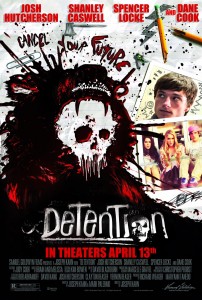 I’ve been sitting on this interview for some time, largely because Joseph Kahn’s Detention remained without a release date or plan for so long after being acquired by Sony. The other reason is that it is simply such an extensive, long interview (which took course over nearly two hours in a busy sushi restaurant) and was a challenge to wrangle onto the page. Between the noise of the recording and the free form conversation between Kahn and his writing partner Mark Palermo, this was like an archeological dig to transcribe. But now that the film approaches it’s 10-city, April 13th release it’s the perfect time to drop this huge conversation.
I’ve been sitting on this interview for some time, largely because Joseph Kahn’s Detention remained without a release date or plan for so long after being acquired by Sony. The other reason is that it is simply such an extensive, long interview (which took course over nearly two hours in a busy sushi restaurant) and was a challenge to wrangle onto the page. Between the noise of the recording and the free form conversation between Kahn and his writing partner Mark Palermo, this was like an archeological dig to transcribe. But now that the film approaches it’s 10-city, April 13th release it’s the perfect time to drop this huge conversation.
I hope you enjoy this very detailed talk about the unique writing process, the decision to shoot it as a self-funded indie, the actual endeavor of filming it, and trying to get traction with such an odd, impossible-to-accurately-describe film. You’ll see the seeds of thoughts and explanations here that the pair would then refine over the next year of Q&As and events and are discussing in their press rounds today. No interview has been or will be quite as through as this though, I’d suspect. There’s nothing in the way of spoilers, besides some open talk about the cross-genre nature of the film. I’ve blacked one particularly revealing sentence, but reading this should do little to rob you of the insane experience you’ll have watching the film for the first time.
This interview took place after the second screening of Detention at SXSW 2011, after I’d published my review of the film. I met both Joseph and Mark for the first time to have this talk, and it’s interesting seeing the two discuss the film before its festival success and divisive-yet-positively-leaning critical response. You can tell even the writers are having trouble fully quantifying their odd little film, which is a challenge critics and audiences have faced in screenings since. Like this interview though, the film is extremely rewarding for those that are open to give it a shot and roll with its experimental oddity.
I’ll be slicing this interview up into three parts for publishing today (Monday), Wednesday, and Friday. Keep an eye out for all of them, and spread ’em around if you would…
Also, make sure you go out and support the film’s 10 theater release this Friday, if it’s playing at a theater near you. It needs your help much more than the big guys, as it’s do-or-die for the film this weekend. Get your tickets here.
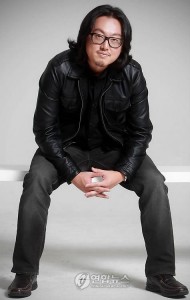 ******************
******************
Renn: So tell me about how you guys first got together, formed the idea, and started on the script.
Mark: Well we got together and started writing the script…
Joseph: You’re better at that memory than I am…
Mark: Okay. Well, I was working as a film critic since I was 20 –it was in ’99 I started that– Joseph’s movie Torque opened and that movie didn’t get many positive reviews for the most part, but I really liked it.
Joseph: No, it got terrible reviews, let’s not mince any words.
Mark: Let’s not mince words: People did not like that movie, for the most part. However I really liked it and I remember a couple of months later I found that Joseph had a website online and it had quotes from different critics reviews from Torque on it, but it didn’t have one from mine. So I emailed the site administrator and asked why it didn’t –just to promote myself, of course– so Joseph wrote me back and said, “yeah, you’re one of the few people who understood my movie, and that feels really good,” and we kind of developed this relationship over email. He read a lot of my past reviews and liked me as a writer, and we just kinda formed this relationship talking about movies and writing and things…
Joseph: It turned out we had a lot similar taste in movies, a lot the same perspectives of what’s good, what’s bad, why people like certain movies and stuff like that. We started hanging out, we went to Cochella music festival after awhile to go see some bands and on the way- you know, if you have a similar taste or sense of humor, it just comes naturally… “Why don’t we make a movie together?” Because at that point I wasn’t even thinking I was going to make another movie, frankly. I had such a bad experience on both the studio level and quite frankly the public just reaming the shit out of me that I was just like, “Fuck that. Why do I need to do this? I love movies, I could watch them.” [chuckle] But then I was with Palermo and then we started talking about our lives and high school, and I just knew that we should make a high school movie now. That where it started- the entire idea of doing a high-school movie was what we came up with and it took us three years to finish the script from that point on.
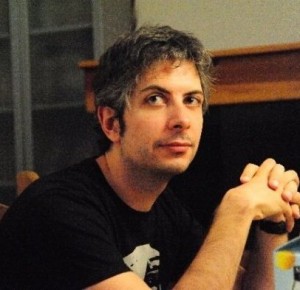 Mark: I think the high school genre at the time -this was about 2007- was pretty dead, because you were getting movies like John Tucker Must Die and High School Musical but it didn’t really have the renaissance it had when Superbad and Juno hit later that year.
Mark: I think the high school genre at the time -this was about 2007- was pretty dead, because you were getting movies like John Tucker Must Die and High School Musical but it didn’t really have the renaissance it had when Superbad and Juno hit later that year.
Joseph: Right.
Mark: So we thought it was kind of the fresh thing to do to make a teen movie, and what Joseph and I liked was John Hughes films- we grew up on those, along with a lot of other genres too. Detention was a great opportunity to bring that together in its own crazy vision.
Renn: So the script is obviously so dense on every level- did that come from writing draft after draft after draft and adding to it, or did you incrementally build it from the very start as you went along?
Joseph: Well here’s the deal- as a filmmaker, one of the biggest questions you have to ask yourself is, “What do I have to say?” Obviously I’m very technically aware and knowledgeable about filmmaking, but when you have all these tools that you’ve learned, then the hardest part of filmmaking isn’t whether I can make a film, it’s can I make a film that I care about? So one of the big steps when we were making this was deciding what we were going to talk about, what genre are we on? We started at a conventional level- “lets pick a genre. What genre appeals to us?” Well, high school films.
One reason that Palermo and I had high school on our minds is that we’re getting older and dealing with that. But maybe for me, and I’m older than Palermo, is that working in youth culture all the time has given me a different perspective. I remember a few years ago I did a video for Ashlee Simpson, and I think that video was in 2004 or 2005, and it was the first time I did a video where I started casting all these high school kids and I looked at them and thought, “Holy shit, I don’t look at these girls as hot,” I didn’t look at them thinking I wanted to have sex with them, I thought they looked young, they looked like kids to me, in my eyes. So for the first time I suddenly realized, “holy shit, I’m getting fucking older,” and there’s a disconnect that’s starting to happen between me and the younger generation. So I guess, we made a movie about that on a certain level.
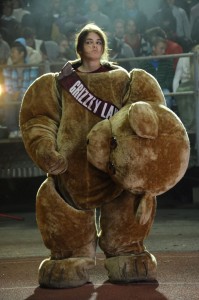 Mark: I was 27 when we started this script, and I was really still thinking about high school a lot, which I found kind of strange. Writing this script was a way of dealing with a lot of those stories and exorcise some of those demons from back then, and it was a pretty interesting process. I think we both had a lot of stories to tell that we got into this script.
Mark: I was 27 when we started this script, and I was really still thinking about high school a lot, which I found kind of strange. Writing this script was a way of dealing with a lot of those stories and exorcise some of those demons from back then, and it was a pretty interesting process. I think we both had a lot of stories to tell that we got into this script.
Renn: So then talk a little bit more about the logistics of writing it.
Joseph: Well, see it first started off like we were doing a high school movie, and then we both thought that doing it as a slasher film would be cool, because we hadn’t seen a slasher movie in a while. I mean, you see like Saw and things like that, but you don’t really see a movie about character running around with a knife stabbing people. Scream came out the previous decade, and we all assume Scream is the first of this one, but really it’s a 90s movie. So we took that and as we processed it, we just sort of have this natural sense of humor to it, we kind of just keep joking a lot, and the next thing you know we kept adding different layers and different jokes. It starts off with irony, when you think about your character and what’s the worst thing she could go through at this point? And then we have a scene where she, whenever the girl is depressed in the first act and she makes a scene or has broken up with her boyfriend, and well, fuck that. Let’s try and have her commit suicide. What the worst thing after that? Oh well she wants to live again and suddenly Cinderhella comes over and attacks her and so shit, let’s put that in. So we started thinking about all these twists and turns, and next thing you know we started thinking about, “well, what if she has to go back in time?” It just started expressing itself though all these crazy ideas, and then in a very rapid period of time we looked at it and went, “this is nothing like what we started with.” And we went some place that was completely radically different.
Mark: I think we spent the better part of year just coming up with cool scenes we wanted to see. Then after that you’re left with this thing and how do we make this make sense and have meaning? And that’s the important thing so we begin pairing a lot of that down and finding what the movie is about.
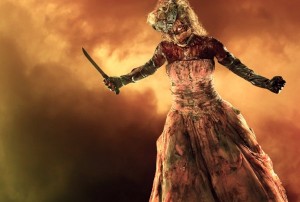 Joseph: And then what you do is you figure out what we are really trying to say here, and about that time Virginia Tech happened- when that stupid ass Korean kid went around and shot all those kids. It made me so fucking angry as a Korean guy. I remember I was walking around town with my head down, being ashamed to be Korean, because this fucking asshole went around and shot all these white kids, ya know? Like, “what the fuck is wrong with you?” I just felt so upset as a human being, and then I started thinking about other kids that did that in high school like Columbine and stuff. You read about these guys where you look at their lives and it’s not even that bad. What are you even fucking talking about? Like, do you guys really think you have the right to tell somebody you can take their lives because you don’t think you’re popular enough? Or people don’t listen to you- it’s ridiculous. So ultimately what we realized is that high school is a place where people are struggling to understand their place in the world, and each other. It’s the one microcosm in society where you can take people from a billion different places that have nothing to do with each other and force them to be together, you know? And the survival of kids in high school — in terms of being adjusted, on a certain level — is about how much can you appreciate another person, how strongly can you empathize with another person and go on to be a better human being? Otherwise, if you don’t you turn into one of these Columbine kids. If you have no ability to empathize with another human being by the time you finish high school, then you failed high school.
Joseph: And then what you do is you figure out what we are really trying to say here, and about that time Virginia Tech happened- when that stupid ass Korean kid went around and shot all those kids. It made me so fucking angry as a Korean guy. I remember I was walking around town with my head down, being ashamed to be Korean, because this fucking asshole went around and shot all these white kids, ya know? Like, “what the fuck is wrong with you?” I just felt so upset as a human being, and then I started thinking about other kids that did that in high school like Columbine and stuff. You read about these guys where you look at their lives and it’s not even that bad. What are you even fucking talking about? Like, do you guys really think you have the right to tell somebody you can take their lives because you don’t think you’re popular enough? Or people don’t listen to you- it’s ridiculous. So ultimately what we realized is that high school is a place where people are struggling to understand their place in the world, and each other. It’s the one microcosm in society where you can take people from a billion different places that have nothing to do with each other and force them to be together, you know? And the survival of kids in high school — in terms of being adjusted, on a certain level — is about how much can you appreciate another person, how strongly can you empathize with another person and go on to be a better human being? Otherwise, if you don’t you turn into one of these Columbine kids. If you have no ability to empathize with another human being by the time you finish high school, then you failed high school.
Mark: I’m not really sure it’s possible to make a high school movie, or a slasher in a high school without having some of these school shooting references. But yeah, we kind of refined some of those. To expand on what Joe was saying, what’s really one of the strong points of this script is that everyone is this stereotype in a way — there’s the hot cheerleader, the stupid bully, etc. etc. — but what we really wanted to do was kind of find the complexity beneath that and everyone has their own secret life and there’s kind of a secrecy in this movie that’s part every character that the other characters don’t understand. I think the problem with a lot of teen movies these days is the pretty awful message to them, “hey kids, your problems really aren’t important,” which is a terrible message to kids. A good message is, “hey kids, everyone has their own problems and deals with their own things.”
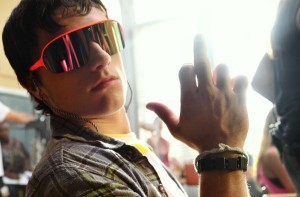 Joseph: I also think that with the secrecy we essentially turn every archetype. A lot of times when you see these high school movies, they play with these broad archetypes and that’s as far as they go – the bully’s the bully, the loser’s the loser – and in our movie we have all those archetypes, but when you delve beneath that you realize each archetype has its own genre, which is kind of the big trip behind Detention. The bully is not just a bully, you find out that he’s turning into a fly and there’s a metaphor. The vapid, 90s-slingin’ popular girl who’s cool because she’s so retro, turns out to be her own Mom, ya know? It’s Freaky Friday. I mean basically if you really look closely in high school, everyone lives in their own genre. Some kids are living a dramedy, some kids are living a comedy, some kids are living like a football film. Everybody has their own genre, so that’s what Detention is, taking everybody and using the metaphor of genre to tell the tapestry of the story. It’s like Fast Time At Ridgemont High on a certain level, but it’s more of a genre mash-up. A tapestry of different things smashed together.
Joseph: I also think that with the secrecy we essentially turn every archetype. A lot of times when you see these high school movies, they play with these broad archetypes and that’s as far as they go – the bully’s the bully, the loser’s the loser – and in our movie we have all those archetypes, but when you delve beneath that you realize each archetype has its own genre, which is kind of the big trip behind Detention. The bully is not just a bully, you find out that he’s turning into a fly and there’s a metaphor. The vapid, 90s-slingin’ popular girl who’s cool because she’s so retro, turns out to be her own Mom, ya know? It’s Freaky Friday. I mean basically if you really look closely in high school, everyone lives in their own genre. Some kids are living a dramedy, some kids are living a comedy, some kids are living like a football film. Everybody has their own genre, so that’s what Detention is, taking everybody and using the metaphor of genre to tell the tapestry of the story. It’s like Fast Time At Ridgemont High on a certain level, but it’s more of a genre mash-up. A tapestry of different things smashed together.
Renn: So, you’ve got a script. Tell me about moving into production on it. You shot RED, you had X amount of dollars which was obviously enough, but not enough to do things on the scale of a huge blockbuster or something, so tell me about figuring out how to pull off the crazy shit that happens in this movie.
Joseph: The funny thing is that we were trying to set this up at a studio for a while. It took us three years to finish writing it, and then I shopped it around and we were really close at one studio- it got up the ranks, we got a producer on board, everything was going well, and then Hot Tub Time Machine came out, and it was a time-traveling thing with a bear every once in a while or something, and originally our film was set in ’85. And in Hot Tub Time Machine they went back to the 80s and I think it bombed or something, so all the studios just said, “no more time-traveling comedies.” And we just sat there and we though, “well shit.” We weren’t worried [about it bombing] so much as the fact that they went back to the 80s. We didn’t think it was a particularly good version of it, but whatever, so we started thinking, “What if we switched it to the 90s.” Because, as a music video director you’re very conscious of retro, and you know I actually made one of the first stabs at 80s-retro-cool with my Moby “We Are All Made Of Stars” video if you’ve ever seen it, and that came out in 2002 when the 80s were really not that hot, you know? And now it just feels like it’s tired to make the 80s cool, and when you’re talking to kids it feels like it’s someone else’s memories. So we started thinking about the 90s and we started re-writing the script to the 90s and all the jokes became so much funnier.
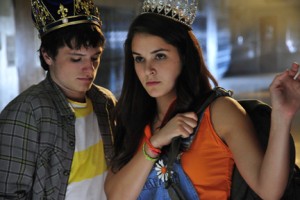 Mark: It’s really funny to me that people coming out of the screenings, it’s such a 90s movie to them. That kinda took me by surprise because – I mean, I know the 90s are a big part of the film. But I’m pleased with how that nostalgia level is working with people. It may be one of the first 90s nostalgia movies and I’m sure there’s going to be a lot more.
Mark: It’s really funny to me that people coming out of the screenings, it’s such a 90s movie to them. That kinda took me by surprise because – I mean, I know the 90s are a big part of the film. But I’m pleased with how that nostalgia level is working with people. It may be one of the first 90s nostalgia movies and I’m sure there’s going to be a lot more.
Renn: Yeah, we’re right on the cusp of it, I can tell it’s starting to happen. They’re starting to go after shit I know and grew up with. So when you changed the script, was it a matter of simply shifting the decades over, or did it start affecting structure?
Joseph: It completely went into a different era and it completely locked us into a demographic. So really, making a movie about kids, they have a sense memory of the 90s, they have no sense memory of the 80s except for what their parents had. It changed a few dynamics too because the Principle Verge (Dane Cook) character is now 18 years older as opposed to 25 years older, so it changes the bracket of how much does he know? The Ione character specifically it completely changes her dynamic, in terms of her pop references. And you have to be very careful about what bands you choose and what she references, because it changes the bracket of what are funny bands to reference that would sound completely whack to a kid living today. You can’t necessarily go in there talking about Foo Fighters, because they’re still relevant, you can talk about C&C Music Factory. You can play a Chub Rock song. You can do All For One or something, you know? And even the Backstreet Boys, they’re my friends and everything but they definitely reflect a very specific kind of 90s.
So you want to talk about production?
Renn: Yeah, tell me about the logistics and easing into this shoot.
Joseph: So we wrote this script, we showed it to the studios, and they were like, “what the fuck? The 90s? Who cares about the 90s,” and they tossed it out. And then at the same time I was working on another movie called Neuromancer, and that fell through- I got fired of that and I was back in commercials. I was in London and I was riding around thinking I was always afraid of making this myself because the task seemed so formidable, but I was thinking in the back of my mind that maybe I’ll just make this as an independent movie. 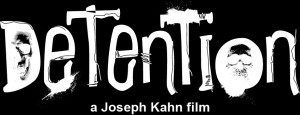 Really it only takes place in a school and a few other locations, so it seemed containable. So I was riding back on a train and my producer was there and my second unit director was there and I turned to them and said, “Guys, we’re gonna make this with my own cash, and we’re gonna make it as soon as we get back to LA, and we start prepping right now.” And they were like, “okay, fine, let’s do it.” So we start talking about it on the train over that two hours and talking about how to get it together, what crew we need, and in our heads I think we just thought of it as doing fifteen music video in a row. That was on a Saturday, we flew back on Sunday, and Monday morning we started prepping- that was July 1st. On July 1st we hired our casting director who immediately went to work, production designer and all that other stuff. A month and a half later it had all been casted, all the sets were being built, all the locations had been scouted, and we’d gone through all the rehearsals. We started shooting that month and a half later with a full cast and everything.
Really it only takes place in a school and a few other locations, so it seemed containable. So I was riding back on a train and my producer was there and my second unit director was there and I turned to them and said, “Guys, we’re gonna make this with my own cash, and we’re gonna make it as soon as we get back to LA, and we start prepping right now.” And they were like, “okay, fine, let’s do it.” So we start talking about it on the train over that two hours and talking about how to get it together, what crew we need, and in our heads I think we just thought of it as doing fifteen music video in a row. That was on a Saturday, we flew back on Sunday, and Monday morning we started prepping- that was July 1st. On July 1st we hired our casting director who immediately went to work, production designer and all that other stuff. A month and a half later it had all been casted, all the sets were being built, all the locations had been scouted, and we’d gone through all the rehearsals. We started shooting that month and a half later with a full cast and everything.
Renn: That’s hardcore.
Joseph: That was August 13th. We were supposed to shoot for 31 days, but because it was an independent movie and I felt like I had one shot at this, I thought- I don’t give a shit, I can go bankrupt, but it needs to be exactly what it needs to be. So we shot for 51 days…
Come back Wednesday to learn more about the shoot, the testing process, and everything else we discussed in our epic interview!
Thanks for reading…
Twitter
Comment Below
Message Board